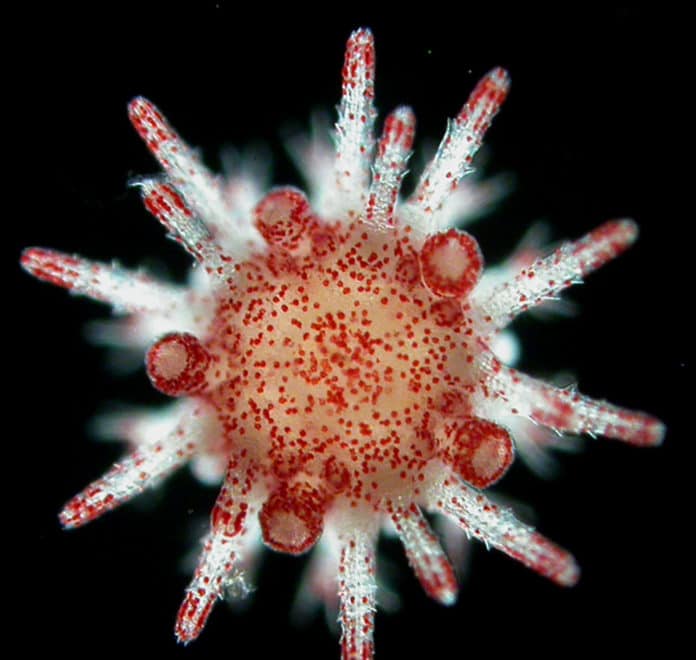Sea urchins are marine animals that are typically small, spiny, and round. Sea urchins are beneficial to the environment and the economy. By consuming the algae that would otherwise take over these systems without urchins, making the ecology simpler and less biodiverse, they maintain the structure and functionality of benthic marine ecosystems.
This role is significant in ecosystems stressed by human activities like nutrient pollution or marine heatwaves, which benefit fast-growing algae that replace critical habitats like coral reefs or larger seaweed forests (e.g., kelp forests). Therefore, the continued survival of sea urchins under global heating is key to the continued function of many marine ecosystems.
With changing climate, the global ocean temperatures are also rising, thereby exposing marine ecosystems to extreme temperatures called marine heatwaves (MHWs). The MHWs can increase the temperature of marine waters by 5°C higher than normal in summer.
A new study determined whether adult sea urchins (Heliocidaris erythrogramma) exposed to marine heatwaves could pass beneficial protective mechanisms onto their offspring, thus ensuring the next generation’s survival.
The results showed that this heatwave resistance might be passed on to the following generation by adult sea urchins. The study did note that these carryover effects might not hold for the duration of the young urchins’ growth and development, though.
The study was conducted by Dr Bayden D. RUSSELL from The Swire Institute of Marine Science (SWIMS) and The School of Biological Sciences (SBS) at The University of Hong Kong (HKU) in collabration with Dr Maria BYRNE, from the Sydney Institute of Marine Science, The University of Sydney (USyd).
Some species of urchins exposed to thermal stress can pass on protective mechanisms to their progeny as a line of defense should the progeny encounter the same kind of stress as their parents. It can be very different whether these “carryover effects” continue to be effective throughout the growth and development of juvenile urchins, enabling them to survive till adulthood. Notably, the study showed that individuals in various life phases might react to thermal stress differently. As a result, reactions in offspring may differ from those in parents.
The research exposed adult sea urchins to different strengths of marine heatwaves and then spawned the adults under these conditions. The offspring were then reared across a range of temperatures, and their development was tracked to assess for carryover effects from the parents to their offspring. Surprisingly, heatwave-conditioned parents produced faster growing, larger and more heat tolerant offspring. If heatwaves continued, however, there was high mortality in offspring.
Dr. Jay MINUTI, the lead author of the study and postdoctoral researcher at HKU SWIMS & SBS, said, “If a MHW occurs at any time during the spawning period of the urchins, these carryover effects could lead to increased survival of the juveniles under what would normally be stressful temperatures. But, if the heatwave continues throughout the larval development, these short-term physiological responses may lead to higher mortality and ultimately reduce the next generation’s survival.”
“Therefore, as these types of extreme events become more frequent and intense under climate change, the beneficial carryover effects of parental conditioning to MHWs will only protect the more sensitive juvenile stage and enhance survival if ocean conditions return promptly to normal temperatures.”
Dr. Bayden Russell said, “These findings are key to understanding what some marine ecosystems might look like under climate change. Sea urchins play a key role in maintaining the function of ecosystems, so if the parents can help their offspring survive the extreme temperatures in marine heatwaves, this may help overall ecosystem function. Unfortunately, the only way to stop heatwaves from becoming worse is to reduce the effects of climate change by reducing carbon emissions. If we don’t, it is clear that heatwaves will devastate marine ecosystems, which are important for human society.”
Professor Maria Byrne at USyd, who uses Heliocidaris as a model species to investigate climate change impacts, said, “The species of urchin that we used, Heliocidaris erythrogramma, is native to Australia and is ecologically important in near-shore areas. Its fast development is key to its success in nature, but also provides opportunities for trans-generational research to understand how marine species might adapt to climate change.”
Journal Reference:
- Jay J. Minuti, Maria Byrne, et al. Live-fast-die-young: Carryover effects of heatwave-exposed adult urchins on the development of the next generation. Global Change Biology. DOI: 10.1111/gcb.16339
